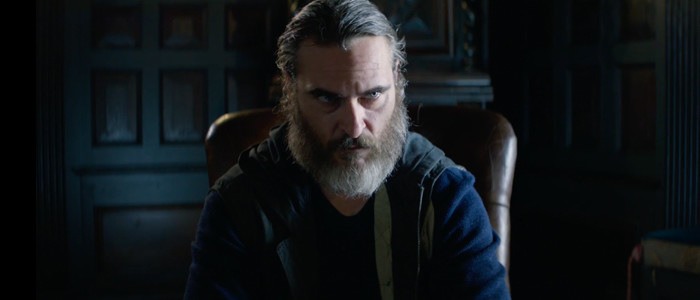
(This article discusses key plot points from Mandy, First Reformed, You Were Never Really Here, Apostle, Burning, and The Haunting of Hill House.)
One of the more indelible images contained in 2018’s cinema arrives at about the halfway point of Panos Cosmatos’ Mandy. Following an unspeakable misfortune, Red Miller (Nicolas Cage) stares down at all that remains of the titular woman he loves (Andrea Riseborough): a charred skull sitting atop a pile of fresh ashes. Without warning, the wind picks up and, as Jóhann Jóhannsson’s haunting love theme throbs, we watch as Red’s reason for being is quickly blown away before his eyes. Suddenly, the entire first half of the film – revolving around the couple’s idyllic, secluded existence – feel like distant memories, lost to the ether of time and space and a fate that eludes anyone’s control but the Gods who live between the planets above our heads.
For all the praise heaped upon Mandy for its “metal” and “insane” nature (and, don’t get this writer wrong, Cosmatos’ movie is insanely metal) what often gets lost in the conversation revolving around the instantly iconic genre picture is how crushingly melancholy it is. At its core, Mandy is a deeply heartrending movie, revolving around a man who literally loses the one light that keeps booze and violence at bay, succumbing to his basest nature as he descends into a literal pit to battle LSD-brained Cenobite bikers, gnarly cult weirdos, and their leader (Linus Roache, channeling Richard Lynch) who’s basically the Faustian manifestation of fragile male ego. This is Alejandro Jodorowsky’s Ghost Rider, only there’s no returning from the abyss with a flaming skull; only the vague recollection of what it once meant to be truly happy with another human being.
Beyond its individual narrative, Mandy’s central loss-laden through-line fits into a rather distinct thematic trend that’s dominated some of 2018’s finest films. The loss of hope for humanity – both the solitary and collective – has pervaded our entertainment to a rather upsetting degree, as many protagonists wrestle with notions of emptiness, their spiritual arcs revolving around re-discovering purpose on an ostensibly corroding planet. Yet it’s not all doomcore gloom, as how these players reconcile this soulful dearth has led to moments of inspiring radiance in these dark rooms; eyes locked onto their images as our hearts yearn for any semblance of love and optimism to be reclaimed. Because without either, all truly is lost, just like Red Miller as he travels a winding road of bloody, coked out vengeance.

The Lost World
Paul Schrader’s latest (and perhaps last) magnum opus, First Reformed, is the most obvious illustration of this fascination. The film revolves around Reverend Toller (Ethan Hawke), a preacher who becomes obsessed with the failing nature of Earth due to humans’ abuse of its resources. Schrader transplants his usual fixations on isolated men, suffering from an existential disease that literally rots away in their stomachs. Like the troubled anti-heroes of Schrader’s Taxi Driver and Light Sleeper, Toller keeps a hand-written journal of his daily thoughts and actions, relayed to us in often monotone voiceover as this Man of God wrestles with his own vanishing place on a planet being eroded by climate change.
Alone in the eponymous 250-year old Upstate New York place of worship, Toller hasn’t so much lost his faith in God as he has in his ability to reach out to a younger generation prone to desperate extremism. When I spoke to Schrader about the movie, he elaborated regarding how the Reverend’s POV is really a reflection of his own thoughts on the state of our universe:
“There is a futility in the air right now, and it’s very thick. You are living in the first generation that no longer thinks the future will be better for your children. And you – as a person – have to ask yourself: ‘how do I live with this? How do I carry on in the face of hopelessness?’
Toller isn’t the only character in First Reformed posing these moral questions, as Mary (Amanda Seyfried) – a young pregnant Christian who fears that her husband Michael (Philip Ettinger) has experienced a similar death of sanguinity – questions whether bringing a baby into this world is anything but an act of cruelty. Toller tries to comfort the boy, but to no avail; discovering him dead from a self-inflicted shotgun wound in the park. Immediately after, Toller slips into his own anguished spiral, all while becoming fanatical about Michael’s lost cause. Though they continue to visit one another, Mary’s mere presence may not be enough to save the Reverend from the abyss, his newfound righteousness just as much a burden as his loss of religious purpose.
While watching both Mandy and First Reformed in quick succession, both the characters of Red Miller and Reverend Toller made this writer recall the final line of Schrader’s initial description of Travis Bickle, the pistol-wielding anti-hero at the center his Taxi Driver screenplay:
“As the earth moves toward the sun, Travis Bickle moves toward violence.”
Indeed, both Red and the Reverend are headed in similar directions, both mourning and crafting weapons for themselves in the form of battle axes and bombs. Yet only one will utilize these vicious tools as extensions of their existential crisis, while the other will be saved by the warmth of another.

If I Had a Hammer
While we’re on the subject of Bickle, the ‘Nam Vet turned low-rent chauffer once wished for a “real rain” to come and wash the “scum” from the streets of New York City. In You Were Never Really Here – Lynne Ramsay’s splintered, harrowing tribute to transmuted trauma – one suspects the rain Travis spoke of has already arrived. Only instead of cleansing the sidewalks and alleys of vermin, it simply caused the cockroaches to scurry indoors, where high-priced brothels offer the flesh of underage concubines to Senators and businessmen harboring appetites for corruption all their own.
Now, it’s up to a silent avenger named Joe (Joaquin Phoenix) to act as a sort of hammer-wielding Noah, pulling these girls from the Biblical tide and returning them to their homes (which may or may not shelter the folks who sold them off to these carnal proprietors in the first place). The grime-caked environments of this NYC are slightly cleaner thanks to gentrification, but certainly just as haunted by the degenerates Travis once so colorfully described. Danger still lurks around every corner of these neon-soaked American conurbations, threatening to relieve Joe of whatever target he’s currently paid to rescue. Yet Phoenix’s soldier of liberation trudges on, as he’s become so damaged due to his time serving his country – overseas in the Marine Corps and wearing the blue windbreaker of an FBI agent – that these quests have become the only way he knows how to maintain any sense of spiritual integrity. In-between, he cares for his elderly mother (Judith Roberts), making sure she doesn’t get too scared watching Psychoby herself while he’s off doing his “job”.
Beyond Joe’s own loss of faith in his personal continuation (often coming to the brink of taking his own life just to feel something again), You Were Never Really Here is hopeless when it comes to institutions. Joe obviously abandoned confidence in being able to serve anyone while he was a soldier/officer of the law. Then the government itself conspires to snatch his latest vector – the daughter of a prominent politician (Ekaterina Samsonov) – from his grip, as local cops and even flag-wearing agents close in, serving the appetites of the empowered, privileged vermin Travis’ rain revealed to be the true threat to American safety.
To call Ramsay’s picture anti-establishment would be a vast understatement. It’s often as paranoid as Alan J. Pakula’s The Parallax View, or any of the other political thrillers from the ‘70s. Authority is only present to be perverted, and menace those truly invested in preserving any shred of innocence. In the end, how could anyone want to do anything but put a gun in their mouth in the middle a crowded diner, blowing their brains out only to have their demise ignored by the other patrons? These are the willfully blind, paying for their pancakes and going about their day, while Joe knows the real truth regarding what evils fester beneath the surface of all American cities, regardless of their post-Giuliani Disneyfication. There are heroes left here, only tortured servants teetering on the brink of oblivion.
Continue Reading Finding Hope in 2018 Movies >>
The post I Am Not Gone: Finding Hope at the Movies in 2018 appeared first on /Film.
from /Film https://ift.tt/2qCYiIH



0 Comments